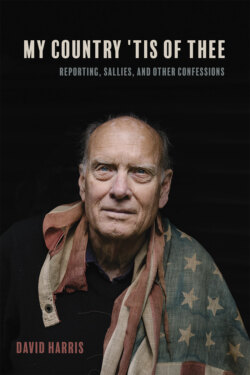Читать книгу My Country 'Tis of Thee - David Harris - Страница 8
На сайте Литреса книга снята с продажи.
Preface
ОглавлениеI have earned my living reporting and writing stories for forty-seven of my seventy-three years.
I started my professional career in March 1973, after the signing of peace agreements that withdrew American combat troops from Vietnam. I had been organizing civil disobedience against the war for almost a decade at that point, including the twenty months I spent incarcerated in federal prison. I was not only a convicted felon but I had dropped out of college (having left Stanford University six years earlier, just fifteen units short of my bachelor’s degree), I was divorced and sharing joint custody of my then three-year-old son, and I was close to broke. I knew I could write, having already authored a peace movement memoir published while I was in prison, but I had never taken a journalism course or worked for a newspaper, and I had only the vaguest idea about the workings of the wordsmithing business I was about to enter.
I started by sending an unsolicited letter to Jann Wenner, the founder, publisher, and editor in chief of Rolling Stone. His magazine had run a story about my release from prison two years earlier, and I thought he might recognize my name. Wenner wrote back and told me to bring him a magazine story and he’d see if I was up to the task. A month later, I returned with “Ask a Marine,” which was not only published but eventually selected for the anthology The Best of Rolling Stone, a volume published in 1993 for the twenty-fifth anniversary of the magazine. After Wenner read my article, he offered me a contract as a contributing editor, a job that paid fifty cents a word plus expenses. I signed on without hesitation and have been at it ever since.
It was a fortuitous time to have entered journalism. With the Watergate scandal inching closer and closer to presidential impeachment, the staid gray lady that journalism had been during the sixties was undergoing a transformation as the mantra “Speak Truth to Power”—heretofore the marching orders of the peace movement I had been part of for a decade—was now becoming the mantra of the fourth estate as it pursued the corruption, dishonesty, and hypocrisy infecting the American body politic at its highest levels. The investigations at the core of this new journalistic flourishing became the principal instrument for bringing transparency, values, and accountability into the heart of democracy. I didn’t need to think twice about adopting that purpose for my own, and it defined my professional life for almost five decades.
The collection of writing in this volume samples the arc of my work, which altogether generated some eleven books and four dozen articles, from its roots in the war and the counterculture that had dominated my coming-of-age; through the stature and professionalism at the New York Times Magazine, where I landed for a decade and won my spurs as a true professional; and eventually to the vagabond life of a freelance wordsmith, still speaking Truth to Power as best I was able. Each of these pieces carries a backstory about their making as well. The article titled “Behind America’s Marijuana High” was, for instance, the greatest risk I ever took to secure a story, and even though it was run on the cover of the New York Times Magazine, I swore afterward never to repeat such risk again. “Understanding Mondale” (published in this volume as “Will the Real Walter Mondale Stand Up?”) was the apex of my journalistic stature, reporting on the leading candidate for the Democratic presidential nomination for the New York Times, again on the cover, and after it came out, I received a telegram from the Times’s executive editor, the legendary Abe Rosenthal, calling it a “purely fine piece,” such high praise being accounted a considerable achievement in the internal byways of the Times. Writing “The Agony of the Kurds” was another risk, but it was also the result of the best expedition I ever mounted on a publisher’s nickel: in tracing the plight and flight of Kurdish refugees as they fled to the West to save themselves, I spent five weeks following them around Syria, Iraq, Turkey, Azerbaijan, Lithuania, and Germany, travels that included my sneaking into Saddam Hussein’s Iraq in a rowboat across the Tigris River.
And so I went over the decades, hopping from one story to the next, convincing one editor after another to back my play, always motivated by the belief that the more America honestly examined itself, the better a people we would be.
That golden age of journalism I was blessed to participate in is over now, overrun by the informational landfill that is the internet, but my faith in that lost era’s tenets remains. Hopefully this look back over those decades will help in its own small way to seed another golden age in which Truth outranks all comers. Certainly today’s America is in desperate need of such committed and heartfelt self-examination, as well as another generation of wordsmiths to induce it.
David Harris
Mill Valley, California
September 2019
